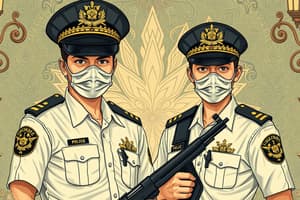Podcast
Questions and Answers
What is the primary focus of policing as described in the text?
What is the primary focus of policing as described in the text?
- Investigating transnational crimes
- Comparing different police systems
- Maintaining peace and order (correct)
- Enforcing international laws
What does the term 'comparative' refer to in the context of policing?
What does the term 'comparative' refer to in the context of policing?
- The collaboration between different police officers
- The process of investigating and comparing police systems (correct)
- The scientific study of international laws
- The degree of likeness between two objects
Why is it important to compare police systems according to the text?
Why is it important to compare police systems according to the text?
- To increase competition among police organizations
- To exchange police officers between different nations
- To enforce international laws more effectively
- To benefit from the experience of others (correct)
What is the 'safari method' mentioned in the text used for?
What is the 'safari method' mentioned in the text used for?
What does the term 'relative likeness' refer to in the context of policing?
What does the term 'relative likeness' refer to in the context of policing?
What is the collaborative method mentioned in the text used for?
What is the collaborative method mentioned in the text used for?
What is the main focus of globalization?
What is the main focus of globalization?
How does globalization impact law enforcement?
How does globalization impact law enforcement?
According to the ALERTNESS TO CRIME THEORY, what happens as a nation develops?
According to the ALERTNESS TO CRIME THEORY, what happens as a nation develops?
What is the basis of the DEMOGRAPHIC THEORY of comparative policing?
What is the basis of the DEMOGRAPHIC THEORY of comparative policing?
What does the OPPORTUNITY THEORY suggest?
What does the OPPORTUNITY THEORY suggest?
Which theory of police service emphasizes that police officers are servants of higher authorities?
Which theory of police service emphasizes that police officers are servants of higher authorities?
What is the main challenge to law enforcement posed by globalization?
What is the main challenge to law enforcement posed by globalization?
What is the focus of the HOME RULE THEORY in police service?
What is the focus of the HOME RULE THEORY in police service?
What does MODERNIZATION THEORY see as a problem?
What does MODERNIZATION THEORY see as a problem?
Flashcards are hidden until you start studying
Study Notes
Focus of Policing
- Primary focus of policing is maintaining public order, safety, and enforcing laws.
Comparative Policing
- 'Comparative' refers to analyzing and evaluating different police systems across various jurisdictions or countries.
- Comparing police systems is vital for understanding different approaches, successes, and challenges in law enforcement.
Safari Method
- The 'safari method' is utilized for observational studies, allowing researchers to gather data on police practices in different settings.
Relative Likeness
- 'Relative likeness' pertains to how similar or different policing systems can be when studied in terms of their structure, function, and societal impact.
Collaborative Method
- The collaborative method focuses on incorporating perspectives from various stakeholders in law enforcement to enhance effectiveness and community relations.
Globalization
- The main focus of globalization is the interconnectedness of economies, cultures, and societies worldwide.
- Globalization impacts law enforcement by creating transnational crime and requiring coordinated international responses.
ALERTNESS TO CRIME THEORY
- As a nation develops, crime rates initially increase due to greater opportunities, followed by a decrease as law enforcement and societal norms adapt.
DEMOGRAPHIC THEORY
- The DEMOGRAPHIC THEORY of comparative policing is based on the idea that population characteristics influence crime patterns and police effectiveness.
OPPORTUNITY THEORY
- OPPORTUNITY THEORY suggests that crime occurs when individuals see viable opportunities to commit offenses, influenced by societal factors.
Service-oriented Policing
- The theory emphasizing police officers as servants of higher authorities is known as the social contract theory.
Globalization Challenges
- The primary challenge posed by globalization to law enforcement is the rise of international crime syndicates and the complexity of jurisdictional issues.
HOME RULE THEORY
- The HOME RULE THEORY in police service focuses on local control and governance of police activities, advocating for community-specific approaches.
MODERNIZATION THEORY
- MODERNIZATION THEORY views existing institutions as problematic, advocating for reforms to adapt to contemporary societal needs.
Studying That Suits You
Use AI to generate personalized quizzes and flashcards to suit your learning preferences.




